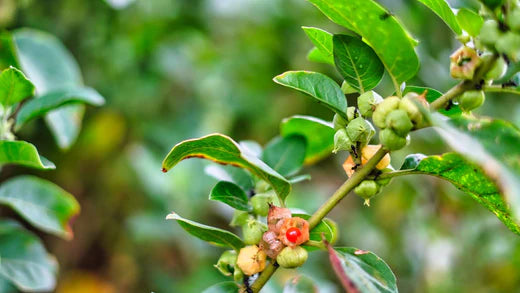Ashwagandha is a small, woody shrub that can reach a height of 35 to 75 cm. Branches radiate outward from the core stem. Long (between 10 and 12 cm), dull green leaves. The shape of the flowers is tiny and rounded. Flowers are 4-6mm in diameter, greenish-yellow, and grouped in the axils. Red berries wrapped in a green, expanded calyx are considered fruits. Strong, long tuberous, meaty, whitish-brown, and aromatic roots are present.
General Information
One of the most effective herbs in the Ayurvedic medical system is ashwagandha. Because its roots smell like horse feces, it is made up of the Sanskrit terms ashwa, which means horse, and gandha, which means stench. This defines a herb that is historically prescribed to boost a person's immune system after illness and has the power of a stallion.
The roots of Ashwagandha contain a variety of biochemically heterogeneous alkaloids. While withanolids are present in the leaves, other alkaloids include somniferine, somnine, and somniferinine. These phytochemicals all have different medicinal characteristics.
Habitat
From the northern tropics to the southern region of India, ashwagandha is widely distributed throughout the country. Additionally, it is widely grown for usage as a natural health supplement. Additionally, Yemen, China, and Nepal are home to it.
Classification
- Kingdom: Plantae
- Subkingdom: Tracheobionta
- Super division: Spermatophyta
- Division: Magnoliophyta
- Class: Magnoliopsida
- Subclass: Rosidae
- Order: Solanales
- Family: Solanaceae
- Genus: Withania
- Species: Somnifera
Alternative Names
- Latin Name - Withania somnifera
- Sanskrit name – Ashwagandha, Kamrupini, Gandhpatri, Balada, Vajini
- Hindi name - Asgandha, Asgandh
- Telugu name - Penneru Gadda/ Dommadolu Gadda
- Tamil name - Amukura, Askulang
- Malayalam name – Amukkura
- Marathi name – Asandh, Doragunj
- Gujarathi name – Aasandha, Ghoda Aakun
- Bengali Name - Asvagandha
- Kannada Name - Ashvagandhi
Ayurvedic Properties
|
|
Hindi / Sanskrit |
English |
|
Rasa (Taste) |
Tikta, Katu |
Bitter, Pungent |
|
Guna (Physical Property) |
Laghu, Snighdha |
Light, Unctuous |
|
Virya (Potency) |
Ushna |
Hot |
|
Vipaka (Post-Digestive Taste) |
Katu |
Pungent |
Effects on Doshas
It balances tridosha, especially Kapha, and Vata.
Classical Categorization
|
Charak Samhita |
Sushrut Samhita |
|
Balya Gana |
Health benefits
- The anti-oxidant effects of ashwagandha aid to strengthen the immune system. It fights off different allergens. so increase your physical strength and endurance.
- It is regarded as one of the greatest herbs for treating infertility and sexual diseases like early ejaculation and erectile dysfunction. It helps to increase libido and increases sexual desire because it is aphrodisiac. It increases sperm production in males and raises sperm quality. It aids in managing hormonal imbalances in females.
- It is thought to be a nervine tonic. It assists in calming down the nervous system. This herb can be used effectively to treat issues like anxiety, stress, sadness, etc. It can also help those with insomnia and sleeping difficulties.
- It is a beautiful plant that supports joint health. The anti-inflammatory effects of the herb aid in the treatment of joint pain and swelling. This plant is very effective in the treatment of arthritis and osteoarthritis.
- Because of its cardiovascular characteristics, it is the one of most recommended Ayurveda for cardiac care. It aids in the strengthening of heart muscles and the maintenance of normal blood flow in the body. It also aids in the maintenance of appropriate blood pressure and cholesterol levels in the body.
- Ashwagandha also supports the respiratory system.
- Ashwagandha's anti-diabetic qualities aid in the reduction of blood sugar levels in the body.
- The use of this plant is beneficial for enhancing thyroid function. Due to its function as an adaptogenic herb, it aids in managing both hypo- and hyperthyroid problems. Additionally, it is beneficial to keep thyroid hormones operating properly.
- Additionally, this herb is brimming with anti-cancerous qualities. These characteristics promote the proliferation of healthy cells while slowing the growth of cancerous ones.
Parts Used
- Roots
- Leaves
Dosage
3-6 gram Ashwagandha powder.
Ayurvedic Products
1. Ashwagandha Capsules
2. Bala Ashwagandha Oil
3. Ashwashila (Shilajit+Ashwagandha)

